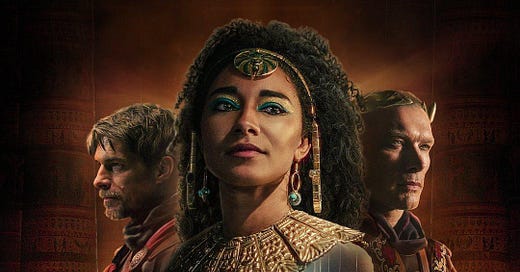The "Rules" About Which Actors Can Play Who Never Made Sense
There were never even actually rules
Netflix is embroiled in a controversy over its new Jada Pinkett Smith-produced show, Queen Cleopatra. In the “documentary series” (their words), Cleopatra is played by Adele James, who is Black. I wouldn’t normally note an actor’s race, but the people who made Queen Cleopatra made it clear that James’ race is a key part of the show: Queen Cleopatra is part of a series called “African Queens”; Pinkett Smith explained “We don’t often get to see or hear stories about Black queens, and that was really important for me.”
This casting choice has caused a firestorm on social media, but hey: What doesn’t cause a firestorm on social media? More notable is the fact that many Egyptians are unhappy. Egypt’s Supreme Council of Antiquities declared the show a “falsification of Egyptian history”, and an Egyptian lawyer filed a suit seeking to shut down Netflix in Egypt. Egyptian satirist Bassem Youssef — seen here being lauded by Jon Stewart on The Daily Show in 2012 — accused Netflix of trying to “take over our Egyptian culture.” In short, Netflix is being accused of “Blackwashing”, an inversion of the “whitewashing” accusation frequently levied against Hollywood.
On its face, Queen Cleopatra would appear to be an egregious violation of Hollywood’s norms about which actors can play which roles. The subject is a historical figure whose lineage is largely know (detailed discussion of Cleopatra’s ancestry to follow) played by an actor whose lineage is decidedly different. The people who claim that figure as part of their history are loudly objecting to the portrayal. We might expect Netflix to be in full damage-control mode; we might expect a groveling statement in which they vow to “do better”, paired with a sizable donation to…I don’t know. Somebody.
That hasn’t happened. And that’s largely because the rules about which actors can play who are an incoherent bunch of nonsense. They’re not even really “rules”; they’re a disjointed series of notions enforced by internet mobs. If we want to address the real problem of insensitive racial portrayals in media, then we should try to tease out some principles about which actors can play which roles.




